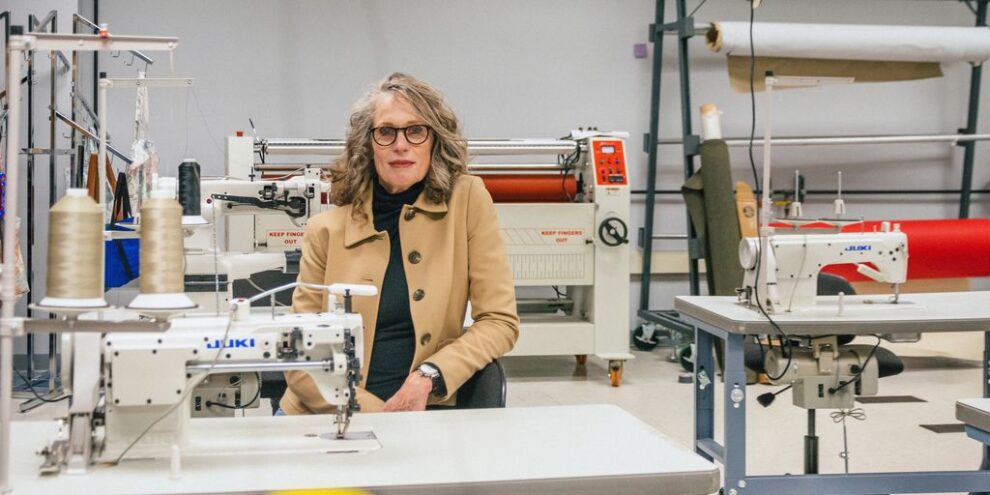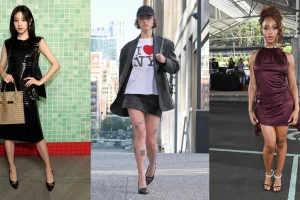Detroit Homecoming has helped spur the growing fashion industry in Detroit.
Two metro Detroit natives who made their name in fashion design moved back to the region after attending Homecoming.
And early conversations about creating a fashion hub in the city helped to open up networks for the effort now operating as the Industrial Sewing and Innovation Center, the only institute for the sewn trades in the U.S.
Jeffry Aronsson, a native Detroiter and former president and CEO of Donna Karan International Inc., developed the idea to create a fashion hub in Detroit after attending Detroit Homecoming in 2016. He spent a year working on the initiative and presented on it, with other design leaders, during the 2017 Detroit Homecoming.
He was tapped by Detroit Mayor Mike Duggan to lead efforts aimed at scaling growth in the city’s fledgling fashion industry and attracting bigger-name designers to the city. Aronsson had a grand idea to create a fashion and manufacturing hub “from dirt to shirt,” with everything, including growing the cotton, here, said Jennifer Guarino, then vice president of manufacturing at Shinola/Detroit LLC.
She was leading a parallel effort, the push for a national institute for the sewn goods that would provide training and apparel production.
They and other fashion industry stakeholders met to discuss their visions and the idea of Detroit as a fashion hub during a meeting at the Detroit mayor’s mansion that fall.
“We got together, looked at our efforts and introduced him to a ton of people here,” Guarino said.
While his vision didn’t carry forward, the national institute did. Launched in spring 2020 to produce medical gowns during the height of COVID, ISAIC is now piloting manufacturing innovations in sustainable, low-waste apparel manufacturing.
Aronsson “created a really significant conversation and brought attention to this issue and really started making us explore and think about fashion and design in a different way than had always been imagined,” said Lisa Katz, senior program officer, economic vitality and entrepreneurship at the William Davidson Foundation, one of ISAIC’s first funders.
Guarino picked up where Aronsson left off, she said. Aronsson had been tied into a group of fashion and design companies in the region like Detroit Denim, Katz said. Guarino “kept them together, brought them together and ISAIC has been the result.”
“Because of (Aronsson) and Detroit Homecoming, we were able to reach out to our networks to bring the industry to Detroit (and) to make the case that this was the place to innovate,” Guarino said.
Fashion designer Tracy Reese.
Other ties to design
Detroit natives who’ve made a name in fashion design have also returned to the city after attending Homecoming.
Detroit native and fashion designer Tracy Reese, whose designs have been carried by Nordstrom, Bloomingdale’s and Neiman Marcus, established her first clothing line in 1998 in New York before moving her design studio to Detroit in 2018.
With the move back to Michigan, she launched Hope for Flowers by Tracy Reese, a women’s clothing and shoe line produced with sustainable fabrics. Last month, she signed a 10-year lease and moved the company to a new location in Detroit’s Midtown neighborhood.
The site includes a design and photo studio, showroom for wholesale buyers, a classroom for art enrichment classes and community workshops and an in-house factory that will host sewer apprenticeships.
Detroit could be the next fashion hub, Reese said during a Today Show interview in late March.
“Detroit is my hometown, and there’s so much possibility in Detroit. It’s a place where you can grow a business, you can make a difference in the community. And that’s why I launched my business there, because I felt like I had an opportunity to affect the community and to be additive to the community,” she told the Today Show hosts. “We also have art enrichment classes for young people because I had art all the way through K through 12, an abundance of art. There isn’t quite as much available in public schools, so we wanted to make sure that we were offering something for young people to do on Saturdays, where they could express themselves and find themselves and also learn about sustainability which is something that I’m passionate about. You know, we’re handing this planet to the next generation. We have to make sure that it’s healthy and that we’re all doing our part to keep it in as good of shape as possible.”
Christina Liedtke, a Grosse Pointe native and Michigan State University alumna, first attended Homecoming in 2016 while serving as director of sales at L’Oreal in New York.
After more than 15 years in sales and marketing for Fortune 500 firms including Johnson & Johnson and PepsiCo, Liedtke found her passion in fashion, launching the Christiana J. Paul ready-to-wear line of luxury women’s clothing.
She moved home during the pandemic and based her Astouri fashion brand — multi-functional designs made with travel friendly fabrics featuring licensed cityscape photography — in Detroit.
Homecoming was a huge factor in making the decision to come back to the region, she said.
You can see the landscape, architectural changes and beautification of Detroit from afar, but you can’t see the innovation happening in the local business community, Liedtke said. “When I attended Homecoming, it drove so much awareness and exposure of all the wonderful things that are happening here, because they aren’t visible to everybody.”
“What influenced me the most about bringing my company here was seeing what other companies are doing and how much of an impact they are making…creating jobs, making the city a better place, driving growth (and) innovating.”
Liedtke said her company is exploring opportunities to bring apparel production back into Michigan, after an earlier manufacturing relationship in Flint ended.
Having Guarino and Reese on panels at Detroit Homecoming and hearing about the work they’ve done in Detroit has also been influential on the manufacturing and design sides, respectively, Liedtke said.
Detroit is on a path to becoming a fashion center, she said. “It’s happening. It’s still going to take some time, but having influential companies like Gucci with Gucci Changemakers (a scholarship and impact fund for grassroots organizations and young, diverse creatives) and having other big brands come here and do fashion shows and invest in the city drives the awareness.”
Source : Crains Detroitig Business




























